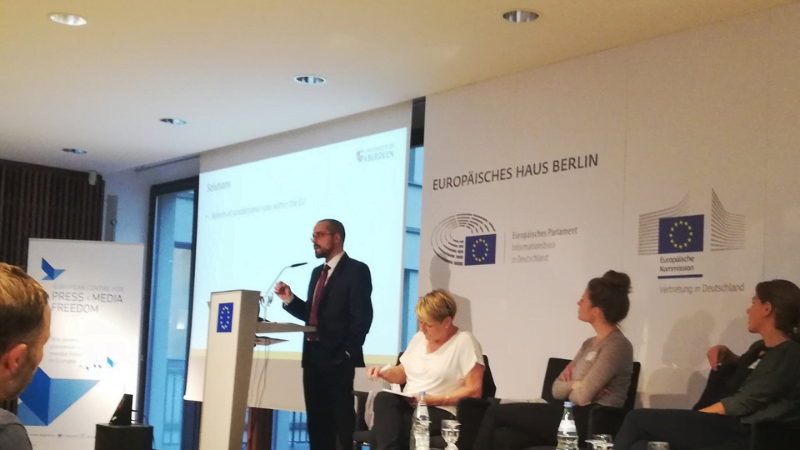Justin Borg-Barthet, a senior lecturer in EU Law at the University of Aberdeen and an expert on identifying loopholes in EU law that suppress the freedom of the media, has called for a change to EU laws to ensure the protection of investigative reporting and journalists.
Speaking at the Uncovered: Investigative Journalism for Europe conference on investigative journalism in Berlin, Germany, Borg-Barthet called for anti-SLAPP legislation in the EU: “We need strong advocacy at Brussels to achieve this.”
He drew particular attention to the situation in Malta where the threat of Strategic Lawsuits Against Public Participation (SLAPP) used by Henley & Partners and Pilatus Bank (whose chairman is facing charges in the US) to silence assassinated journalist Daphne Caruana Galizia, The Shift News, and most other independent news portals in Malta (only those who claim to be independent but toe the government line were spared).
SLAPP is a form of legal action that forces the defendant to spend significant amounts of money on a lawsuit without merit designed to silence and intimidate journalists or publications while draining their financial resources.
Such cases are filed in jurisdictions handpicked because of exorbitant costs and a long legal process, with little intention of the matter ever making it to court or the plaintiff actually winning the case. The aim is to kill the story because news organisations can never meet the cost of defending the story in the public interest.
Speaking as a part of a panel on ‘How to Create an Enabling Environment for Investigative Journalism,’ Borg-Barthet spoke of the “rampant corruption unfolding in Malta” and how the EU was at risk of its influence and prevalence being exported to other Member States.
Highlighting the lack of support for investigative journalism in Malta, he appealed to the EU to tackle the issue by introducing measures that would put the burden of proof on the plaintiff, as well as ensuring that journalists were protected from the “threat of ruinous proceedings to silence critical reporting”.
“The practice of SLAPPs circumvents due legal process and effectively silences media reporting where the client has enough money to pay London law firms to make these threats. It fundamentally undermines any right to a fair trial,” Borg-Barthet said.
Only a few weeks after The Shift was launched in November 2017, Henley & Partners (the “citizenship consultants” contracted by the Maltese government to sell Maltese citizenship), threatened The Shift News with legal action if an article on the firm’s involvement in Granada was not withdrawn.
The Shift News was the only news organisation that did not comply with demands from SLAPP threats, as story after story on wrongdoing in the country linked to these two companies disappeared.
Henley & Partners chairman, Christian Kalin then told MEPs investigating the rule of law in Malta that the firm “only sued, or threatened to sue” Maltese journalists with the approval of Prime Minister Joseph Muscat.
At the conference, academic lawyer Borg-Barthet presented recommendations on the prevention of SLAPP suits and various suggested reforms for the EU defamation law.
His suggestions include ensuring that natural persons should not be forced into litigation in unfamiliar or costly foreign jurisdictions. The draft stressed the importance of journalists being able to predict which laws will apply to them, rather than being left exposed to a vast number of laws from from foreign jurisdictions.
Specific reference was made to Pilatus Bank threatening Maltese media portals with costly litigation in the US and UK. Most of the sources complied by deleting or amending a number of articles from their archives.
[Pilatus] Bank was able to “alter the journalistic record” which then constituted a “breach of both the fundamental right to freedom of expression and the fundamental right to a fair trial.”
Borg-Barthet also said that in order for freedom of expression and the rule of law to be truly respected, change is needed on how defamation cases are brought forward.
“In view of the central role of the press in safeguarding the rule of law – indeed, in view of freedom of expression’s foundational value as a prerequisite for the existence of the rule of law – it is submitted that the balance between rights of pursuer and defendant in defamation cases should be re-altered,” he said.
In mid-2018, the Maltese government voted against amendments to the law that would protected journalists from the threat of foreign SLAPP suits that are intended to silence and intimidate the freedom of the press.












